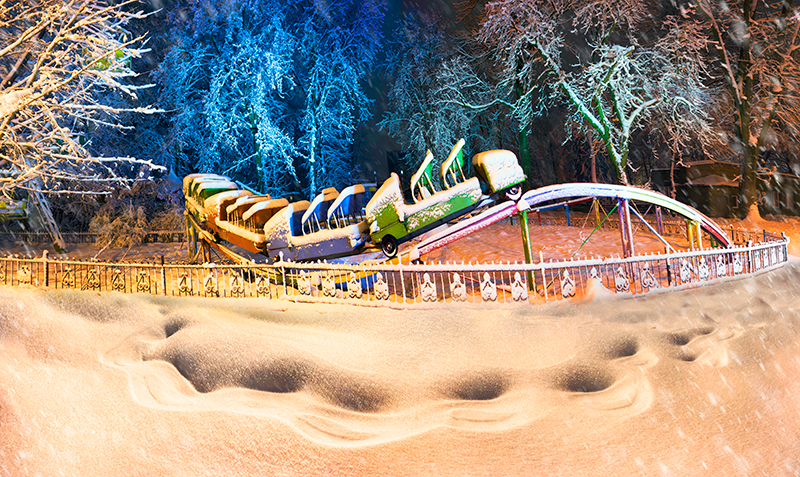Traditionally, the season for carnivals and theme parks runs from April through September each year. You might assume that the seasonal autumn and winter closure is due to declining demand. However, special events like Six Flags Fright Fest prove that theme park fans will brave the elements.
Cold weather closures are commonplace to protect the integrity of the ride’s engineering, as malfunctions and operating issues are more likely to occur in lower temperatures. The closure season is the ideal time to perform routine ride maintenance at amusement parks.
This blog will examine the reasons behind cold weather closure and ways amusement parks can make the most of the downtime.
Cold weather poses safety and mechanical concerns
When temperatures drop below 40 degrees Fahrenheit, a whole host of mechanical issues arise for roller coasters. Cold weather creates increased friction between roller coaster wheels and tracks. Additionally, grease may not warm enough to efficiently lubricate the tracks, wheels, bearings, and other moving parts.
Hydraulic brake fluid and the computer components that regulate ride safety also have increased failure rates in the cold. Most newer rollercoaster computer systems have built-in fail-safes that do not allow operators to run a ride when temperatures fall below 40 degrees.
All these factors make ride operations in cold weather unsafe. When theme parks and carnivals shut down for the season to maintain safety, park management can shift their attention to ride maintenance, employee training, and renewing certifications.
Offseason ride maintenance is critical
The cold months of the year are the busiest for ride technicians and mechanics. They have a methodology of maintenance procedures to run while the rides are shut down for the season, including:
- Removing cars, seats, and trains from their associated rides
- Disassembling and reassembling the cars and trains to replace, repair, and upgrade them as needed
- Storing the reassembled cars in warehouses
- Required manufacture inspection and testing for each ride
- Cosmetic repairs and improvements such as paint
- Inspecting electric, HVAC, and other systems
Also read: Best Practices for Incident Prevention in Amusement and Entertainment
Make compliance, training, and education a priority
While ride technicians are hard at work maintaining the mechanical integrity of rides and attractions, the offseason is an ideal time for park owners to address compliance, training, and certifications for their employees.
Review ASTM Standards
Each state has its own specific set of standards that demand compliance. For example, in Ohio, Tyler’s Law requires documentation for ride ownership, inspection reports, and other relevant materials to be kept in a database as long as the ride is operational.
The American Society for Testing and Materials (ASTM) provides a set of standards for a wide range of industries, including theme parks. Scheduling inspections to ensure that rides meet the ASTM’s rigorous standards is a valuable use of time during the winter months. Note that many states have requirements regarding how often a ride is inspected per year, depending on the size and type of ride.
If an issue is found, owners need to develop a plan to address and correct them well before re-opening. Proper documentation also needs to be filed with the appropriate state oversight organizations.
IAAPA Certification
The International Association for the Attractions Industry (IAAPA) offers several certifications that theme park professionals have developed. IAAPA offers the Certified Attractions Professional Executive (ICAE) for C-level staff and the Certified Attractions Professional (ICAP) for management and other park staff.
Investing in certification for staff during the offseason is a great way to boost morale, build peer leadership, and increase productivity. Certification is also attractive for employees hoping to boost their career prospects. IAAPA Certification is a win-win situation.
Also read: If Faced with a Lawsuit: The Importance of Frontline Training
Mobile Food Vendors
Any staff members involved in food service at amusement parks and carnivals must be certified via the ServSafe Program. These certifications expire every few years. Therefore, winter is ideal for checking in with staff and food vendors to ensure that their ServSafe accreditation is up to date.
There are two levels of certification. The first is the Food Handler License, which anyone involved with handling or cooking food must-have. The second level for management of food operations is two-fold. The minimum requirement is that food vendors have a Person-in-Charge (PIC) who keeps records and maintains food safety standards. But managers may also seek to become a Certified Food Manager (CFM). To learn more about ServSafe certification, you can visit their website or reach out to your local restaurant association.
Also read: Food Concessions: What Concessionaires Need to Know
Trucking
Carnivals, festivals, and theme parks have unique transportation needs. They must transport their rides and attractions hundreds of miles, sometimes daily. Even permanent theme parks may need to transport equipment between locations.
If you have your own fleet of trucks, it is essential that drivers stay in compliance with the Department of Transportation. Alternatively, you must confirm that any trucking vendors have everything that enables them to safely and legally transport rides and equipment. For example, do all drivers have their current commercial driver’s license on file? Are your vendors aware of any new changes to regulations, and are they compliant? Now is the time to check.
Review your insurance coverage
Perhaps the most crucial item in the offseason maintenance checklist is reviewing and updating insurance coverage. Changing legislation (such as Tyler’s Law) places the burden of responsibility squarely on park owners and managers, often requiring more insurance coverage than is required by law.
McGowan Allied Specialty Insurance has over 35 years of experience in the entertainment industry. We offer a deep understanding of the specific challenges facing carnivals, theme parks, festivals, and attractions of all kinds.
Let us help you learn more about strengthening your amusement and entertainment insurance coverage.
